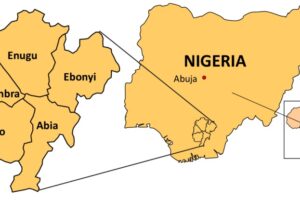
Christian C. Madubuko, PhD.
In the complex tapestry of international relations, few countries have navigated the treacherous waters of diplomacy with greater finesse than Nigeria. As the most populous country in Africa and a key player in the global economy, Nigeria’s relationships with other nations are multifaceted and far-reaching. None are more significant, however, than its complicated ties with the United States and China.
Like two rival suitors vying for the heart of a beautiful maiden, the United States and China have long been competing for Nigeria’s attention. Both have showered the West African nation with attention, promising aid, investment, and support in exchange for loyalty and cooperation. But beneath the surface of this diplomatic dance, a tale of two alliances unfolds – a tale of love, betrayal, and power.
The Early Years: A Love Affair with America
Nigeria’s relationship with the United States dates to the country’s independence in 1960. Initially, Nigeria was seen as a trusted ally and strategic partner by the United States, which viewed Nigeria as a bulwark against Soviet expansionism in Africa. The US provided significant economic and military aid to Nigeria, helping to stabilize the young nation and promote its economic development.
In the 1980s, Nigeria’s military government, led by General Ibrahim Babangida, solidified its ties with Washington by signing a military assistance agreement and participating in joint military exercises. The relationship continued to blossom during the 1990s, with the US providing millions of dollars in aid to support Nigeria’s transition to democracy. But beneath this façade of cooperation, tensions simmered. Nigeria grew increasingly frustrated with what it saw as America’s double standards – criticizing human rights abuses while ignoring similar atrocities committed by other African nations. This perception was exacerbated by the US-led invasion of Iraq in 2003, which many Nigerians saw as an example of American hypocrisy.
The Rise of China: A New Love Interest
Meanwhile, China had been quietly building its relationship with Nigeria from the 1970s onwards. Initially, China focused on providing economic aid and technical assistance to Nigeria’s agricultural sector. But as the years passed, China’s ambitions grew more grandiose. In 2005, China announced plans to invest $5 billion in Nigerian infrastructure projects, including roads, bridges, and power plants.
Nigeria was smitten. The country saw China as a new source of financial support and a potential alternative to American dominance. In 2010, Nigeria became one of the first African countries to sign a framework agreement with China on strategic cooperation. The partnership included agreements on oil and gas exploration, mining, and infrastructure development.
The Competition Heats Up:
As China’s influence grew, so did competition for Nigeria’s attention. The US responded by increasing its own investment in Nigeria’s energy sector and providing more scholarships for Nigerian students to study in America. In 2014, President Barack Obama launched Power Africa, a program aimed at doubling access to electricity in sub-Saharan Africa over five years.
But tensions between America and China reached a boiling point in 2018 when the US imposed tariffs on Chinese goods worth $50 billion in retaliation for Beijing’s alleged intellectual property theft. Nigeria was caught in the crossfire, struggling to balance its relations with both superpowers.
A Love-Hate Relationship: The Complexities of Nigerian-American Relations
Nigeria’s relationship with America is built on a complex web of love and hate. On one hand, Nigeria relies heavily on American aid and investment to drive its economic growth. The US is also home to thousands of Nigerian students pursuing higher education and professionals working in various industries.
On the other hand, many Nigerians resent American meddling in their internal affairs and what they see as blatant disregard for their sovereignty. The country has long been critical of US foreign policy decisions that seem biased towards Israel over Palestine or favour European nations over African ones.
The Unrequited Love: Nigerian-Chinese Relations
Nigeria’s relationship with China is marked by an unrequited love affair. Beijing has poured billions of dollars into Nigerian infrastructure projects without demanding concessions or reciprocity. Chinese companies have also invested heavily in Nigerian energy production, agriculture, and manufacturing sectors.
However, many Nigerians remain wary of China’s intentions. They worry about Beijing’s increasing influence over Nigeria’s economy and potential risks associated with Chinese loans – including debt traps and environmental degradation.
Conclusion: A Balancing Act
As Nigeria navigates its relationships with both superpowers, it must walk a delicate tightrope between love and pragmatism. While neither America nor China offers a perfect solution to Nigeria’s development challenges, both countries can provide valuable resources and expertise.
Ultimately, Nigeria must prioritize its national interests above all else – even if that means adopting a more nuanced approach to international relations. By diversifying its partnerships and strengthening regional ties with African nations like South Africa and Egypt, Nigeria can reduce its dependence on any one superpower and promote true sovereignty.
In this complex game of diplomatic chess, only one thing is certain – Nigeria must be prepared to adapt quickly to changing circumstances and navigate the treacherous waters of international politics with finesse if it hopes to emerge victorious.
Recommendations
Diversify partnerships: Reduce reliance on any one superpower by diversifying partnerships with other nations like South Africa, Egypt, and Brazil.
Prioritize national interests: Put Nigeria’s interests above all else when negotiating with foreign powers.
Promote regional integration: Strengthen regional ties with African nations to promote economic cooperation and political stability.
Develop homegrown solutions: Invest in domestic infrastructure development rather than relying solely on foreign aid or investment.
Improve communication: Enhance communication channels between government agencies to ensure effective coordination on foreign policy issues.
Enhance transparency: Increase transparency around foreign deals and agreements to build trust among citizens.
Develop human capital: Invest in education and skills development to increase competitiveness in global markets.
Promote entrepreneurship: Encourage entrepreneurship and innovation to drive economic growth.
Foster strong diplomatic ties: Strengthen diplomatic ties with friendly nations like Turkey and India.
Be prepared for changes: Anticipate changes in global politics and adapt quickly to maintain national interests.
By following these recommendations, Nigeria can navigate the complexities of international relations like a master diplomat – striking a delicate balance between love and pragmatism to achieve true greatness on the world stage.
Dr. Christian C. Madubuko – a Political & Diplomatic Historian, is a Senior Lecturer at the Department of History & International Studies, Nnamdi Azikiwe University, Awka, Nigeria, & a researcher at LaTrobe University, Melbourne, Australia. Madubuko was a former Anambra Commissioner for Trade and Commerce as well as the Executive Director of Operations, Anambra Internal Revenue Service. He writes from Canberra – The Australian Capital Territory, ACT. Mobile/WhatsApp: +2348162527884
E-mail: ogbekingdom@gmail.com




